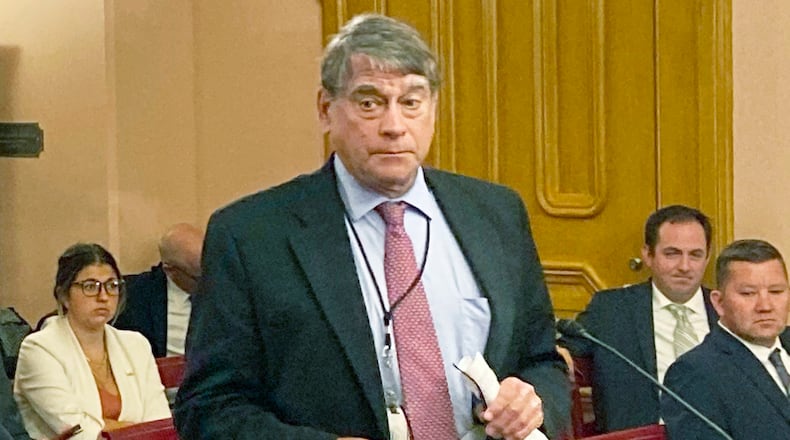DeWine gave the hand-picked group until Sept. 30 to come up with a plan to tackle soaring property taxes that some politicians have said are driving people from their homes.
Concerns about property taxes have always been around, but complaints reached a crescendo in 2023 when local taxpayers saw huge property value hikes. In Butler County, they jumped an average 37%, Greene County 30% and Montgomery County 34%.
Former legislators Bill Seitz and Pat Tiberi are co-chairing the group and the rest of the members include three county commissioners, two county auditors, a county treasurer, two school superintendents and a mayor. They’ve been meeting weekly since the end of July.
The only committee members from southwest Ohio are Seitz, who hails from Cincinnati, Hamilton County Commissioner Denise Driehaus — one of two Democrats on the panel — and Warren County Auditor Matt Nolan, who is also president of the County Auditors Association of Ohio.
The working group held it’s final meeting on Thursday, which was closed to the public, putting finishing touches on the report to the Republican governor. The group members had haggled over the rough draft in a Sept. 18 meeting. The draft includes about 20 recommendations.
A study by this news outlet shows 13 of the ideas were already suggested — in some ways — by the bi-partisan legislative committee tasked with the same job last year.
Seitz told this media outlet, “We are building on what they recommended with greater specificity.”
A special Joint Committee on Property Tax Review and Reform was authorized in the previous biennium budget. The bi-partisan committee of state legislators — three Republicans and two Democrats from each chamber — met eight times last year, received in-person and written testimony from 60 people — experts in a wide array of topics pertaining to taxes and the services they fund — and on the New Years Eve deadline delivered an 865-page report.
It contained 21 recommendations for various ways the general assembly “should” act to address the problem, but it was relatively vague.
For example, there are two recommendations pertaining to school districts’ use of emergency, substitute and continuous levies. One says the terms and renewal options of these levies should be reduced and another suggests “clarifying the terminology and narrowing the uses” of emergency and substitute levies, to prevent their use in non-emergency situations.
The two groups generally agreed on three of the four items DeWine axed from the budget that had been proposed by the legislative group — that group didn’t discuss limiting school budget carryover. DeWine said his vetoes were over his concern that these items would harm schools and children.
DeWine’s working group tweaked the three items in the legislative group’s proposal it agreed with to hopefully make them more palatable.
The tweaks include:
The two groups generally agreed on three of the four items — the legislative group didn’t discuss limiting school budget carryover — DeWine axed from the budget. He said he was concerned they would harm schools and children. His working group tweaked them like this to hopefully make them more palatable:
- Clarity on vague language about emergency levies. The governor’s group proposes to “Restrict emergency levies to entities under fiscal caution, watch or emergency as defined by the Auditor of State or in an ‘act of God’ situation.”
- The budget called for limiting school district carryover to 40% of their expenses and requiring excess funds be refunded to taxpayers. The group upped it to 100% but said they can justify more to the budget commissioner. They may expand the restriction to all taxing bodies.
- New emergency or substitute levies for school districts within the 20-mill floor calculation would be allowed. Existing levies would have a five-year grace period.
- Giving county budget commissions the authority to “unilaterally” reduce a levy passed by voters if they determine the funding isn’t necessary. The group says budget commissions can’t touch levies until they have been in effect for five years for new and two years for renewals.
- Eliminating replacement tax levies for all taxing bodies was deemed fine.
Legislators have introduced 744 bills this year and 36 of them touch property tax reform. The reforms suggested by the two groups are either directly or somewhat contained in 26 existing bills.
Seitz told this media outlet they are recommending a tax deferral plan for seniors and a “modest expansion” of the homestead exemption. The state tax department has estimated changes to the homestead exemption would cost the state $87.8 million in less property tax collections. The deferral program costs are harder to predict since not everyone will participate. Minnesota has around 450 to 500 participants at a cost of $2 million.
The recommendations by both groups also include reforms that attack the system, rather than providing immediate tax relief. Some include limitations to tax incentives, more transparency around and simplifications to the tax levy system, wavers for interest and penalties on some delinquent taxes and a governor’s committee to study “condensing the size of government.”
Seitz said property tax reform is going to take a multitude of solutions, “I’d put it all altogether and to steal the phrase from President Trump, I would have one ‘big beautiful bill’ that deals with this issue in a multiplicity of ways.”
About the Author
